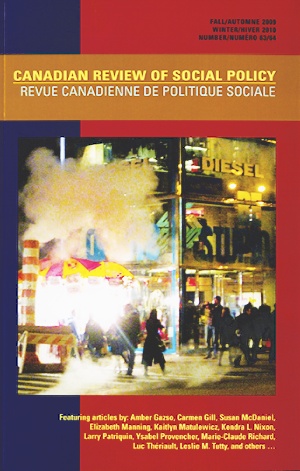Public Employment Policy Professionals in Industrialized Countries: Different Contexts and Similar Practices
Abstract
Based on a review of predominantly French, Canadian and American literature this article deals with employment coaching of populations excluded from the labour market. This is a new function that emerged from the activation of public employment policies over the past few years, and has become now the principal mode of commitment of the state towards populations excluded from the labour market. Focusing on the discourse and practices of counselling professionals, concerning the development of this function, the article highlights the impact of transactions between agents of public policy and their clients on the effects of reforms to social assistance programs. While day to day practices vary among coaching providers according to their specific environments, the literature review shows a convergence of practices among agents of public, private or community employment policies in the use of their own social networks, the constraints they encounter and the strong relational aspects they associate with their counselling function. In concluding, the article notes a lack of awareness of their roles as intermediaries in the labour market, in and in particular about their use of organisational procedures, strategies, and rationale for their actions. S'appuyant sur une recension d'kcrits principalement fran~aisc, anadiens et amCricains, cet article traite de l'accompagnement en emploi des populations exclues du march6 du travail, une fonction ayant emerge de l'activation des politiques. Public Employlnent Policy Professionals in Industrialized Countries publiques de l'emploi des dernikres annkes et qui devient le principal mode d'engagement de l ' ~ t a t envers les populations exclues du march6 du travail. En s'attardant particulikrement aux discours des professionnels de l'accompagnement sur la mise en oeuvre de cette fonction, I'article souligne le rBle des transactions entre les agents des politiques publiques et leurs clients sur les effets des reformes des regimes d'aide sociale. Bien que les pratiques quotidiennes des charges d'accompagnement diffkrent selon les contextes specifiques dans lesquels elles s'inscrivent, des etudes recensges indiquent une convergence des discours des agents des services publics, prives ou associatifs des politiques de l'emploi en ce qui a trait 5 l'utilisation de leur rCseau social, aux contrainces qu'ils rencontrent ainsi qu'5 la forte dimension relationnelle qu'ils associent 2 la fonction d'accomnpagnement. Particle se conclut en constatant le manque d'information lie ii ces acteurs interlnkdiaires du march6 du travail, notamment sur leurs modes d'organisation, leurs strategies et les justifications de leurs actions.Downloads
Published
How to Cite
Issue
Section
License
1-The author guarantees that the manuscript is an original work not published elsewhere in print or electronically in whole or in part, except in abstract form, that the author has the full power to make this contribution, and that the manuscript contains no matter libelous or otherwise unlawful or which invades the right of privacy or which infringes any proprietary right.
2-The author guarantees that the manuscript has not been previously published in print or electronically and that if the manuscript contains any tables, figures or images fully reproduced or closely adapted from previously published material, the author must obtain the necessary permission from the author/publisher holding the original copyright prior to publication in CRSP. The author may be required to produce evidence of permission granted to CRSP’s editors.
3-As a condition of publication in CRSP, the author assigns all copyright to CRSP, including but not limited to the right to publish, republish, and otherwise distribute this manuscript in print, electronic, or other formats. As CRSP is a non-profit interdisciplinary scholarly journal, the author will receive no royalty or other monetary compensation for the assignment set forth in this agreement.
For the purpose of full disclosure, CRSP will not normally use the content provided by the author in a commercial venture, but for the purpose of disseminating the author’s content to as many readers as possible. For distribution, third parties engaging in commercial activities may be contracted to distribute the content globally, and such parties may make a profit out of the author’s content in their normal course of business. CRSP will not pay the author or reimburse the author in any form based on such commercial activities because the conduct of such commercial activities is outside the control of CRSP.
Any future reference to or use of this published material by the authors must acknowledge CRSP as the original place of publication.
PERMISSION REQUEST/ARCHIVING
Permission is given to author(s) receiving funding via Tri-Council Agencies, the Canadian Institutes of Health Research (CIHR), the Natural Sciences and Engineering Research Council of Canada (NSERC) and the Social Sciences and Humanities Research Council (SSHRC), to make their publications freely available in an Open Access repository within the stated deadline by the Tri-Council Agencies (12 months following publication). Archiving of publication must be a manuscript copy bearing none of the CRSP headers, footers or any other distinguishing marks. No links to the article on the CRSP website is permitted.
Permission requests from third parties to reproduce articles in part or full in academic/educational publications can be directed to the managing editor of CRSP, and will not be unreasonably denied.

